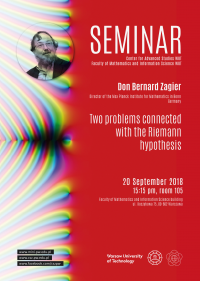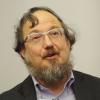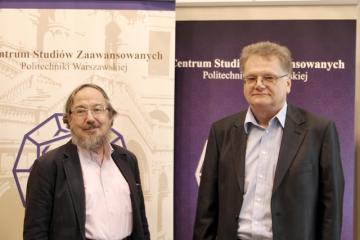Seminar -"Two problems connected with the Riemann hypothesis", prof. Don Zagier, 20.09.2018
The seminar will be held by professor Don Bernard Zagier at the Faculty of Mathematics and Information Science, Warsaw University of Technology (WUT), on 20th of September 2018 starting at 3.15 p.m., Koszykowa 75 street, room 105.
The two problems in question are completely different from one another, but have in common that each is related in an unexpected way to the Riemann hypothesis. One of them concerns the universal limiting position (after rescaling) of the zeros of polynomials belonging to a rather general class, with as an application a weak version of a 90-year-old conjecture of Polya that in its strong version would imply the Riemann hypothesis. The other gives an equivalence between the generalized Riemann hypothesis for the L-series of odd Dirichlet characters and an elementary-looking statement about the growth rate of the determinants of certain matrices whose entries are finite sums of cotangent, with an unexpected appearance of quantum modular forms as a byproduct.
***********************************************************************************************************************
Professor Don Bernard Zagier is an American mathematician whose main area of work is number theory. From 2006 to 2014 he was professor at the Coll├Ęge de France in Paris, France. Since October 2014 he has also been a Distinguished Staff Associate at the ICTP. Don Bernard Zagier currently holds the position of director of the Max Planck Institute for Mathematics in Bonn, Germany.
Zagier was born in 1951 in Heidelberg, Germany. He wrote his doctoral dissertation under of Friedrich Hirzebruch in Bonn, obtaining his PhD at the age of 20. He received his doctorate at the age of 23 and was appointed professor at the age of 24.
Zagier won the Cole Prize in number theory in 1987, the von Staudt Prize in 2001 and the Gauss Lectureship of the German Mathematical Society in 2007. In 1997 he became a foreign member of the Royal Netherlands Academy of Arts and Sciences and in 2017 a member of the National Academy of Sciences (NAS).
***********************************************************************************************************************





